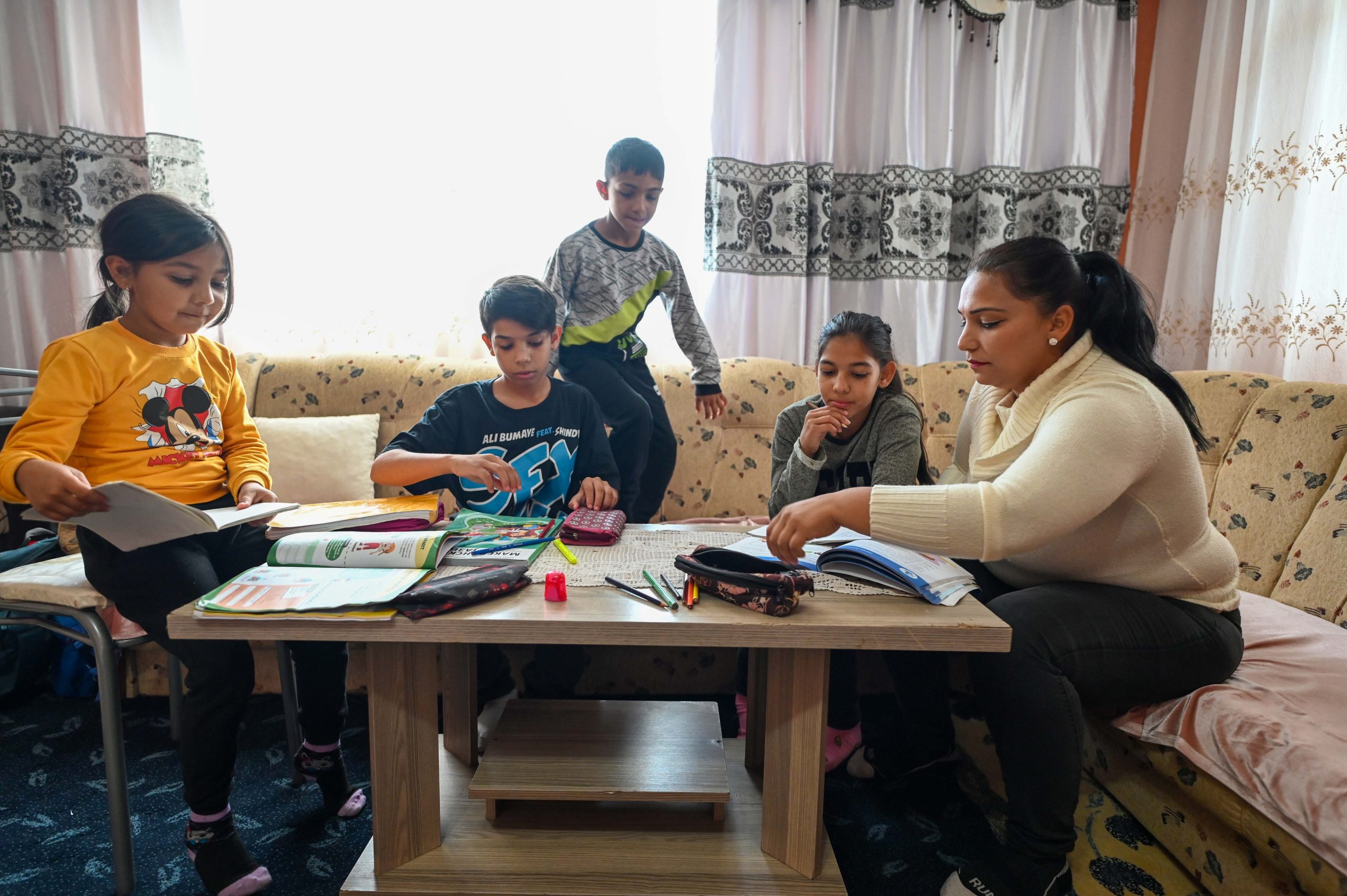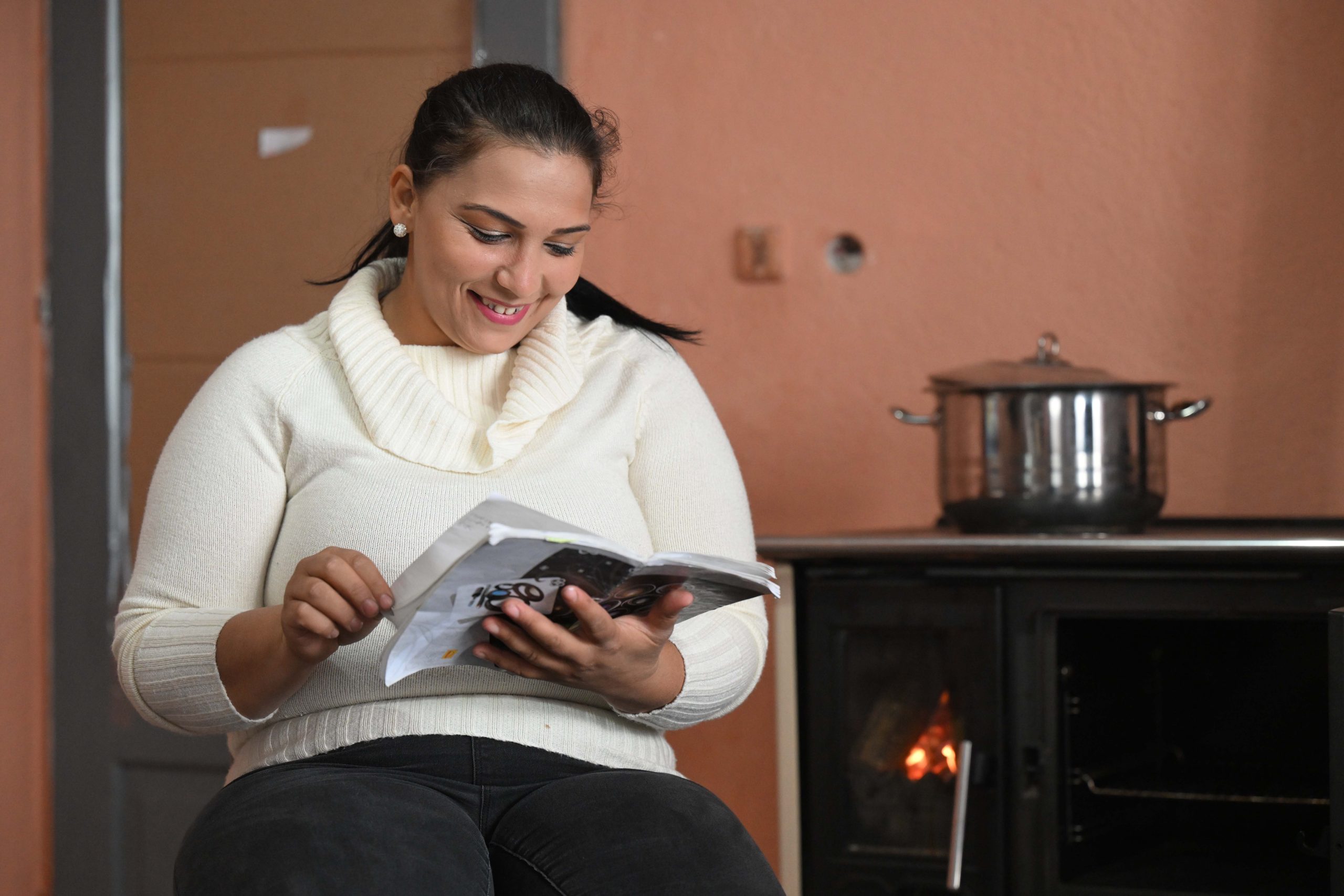
Over the past few weeks, Ajnur Ibraimovski, a 37-year-old returnee to Prilep, a municipality in North Macedonia, has been actively attending classes at the local public elementary school. Alongside 21 other classmates, all returnees to Prilep, Ajnur is enrolled in a 6-month program that will enable him to complete his primary school education. Reflecting on his past, he explains, “I attended school up to the 4th grade… but due to financial constraints at home, I had to leave school to find work.”
Ajnur’s quest to escape poverty also led him to attempt migration to Germany, where he hoped for better job prospects and quality of life. After two years abroad, he returned to Prilep. However, finding a stable job back home proved challenging. In North Macedonia, formal employment requires the completion of primary education. In Prilep, where companies are actively seeking workers due to specific labor market dynamics, Ajnur’s lack of completed primary education posed a significant barrier to formal employment. According to a recent survey, nearly 30% of employers in the region reported difficulties in finding qualified workers. Ajnur elaborates, “Companies are seeking individuals who have completed their schooling.”
“Companies are seeking individuals who have completed their schooling.”
Ajnur Ibraimovski, (returnee, Prilep, North Macedonia)
After his return, Ajnur secured a short-term position at a company in Prilep, where he now has the opportunity to transition into a more stable role as a forklift operator. However, to pursue this job, he must ensure that his educational qualifications align with the labor regulations in North Macedonia. Consequently, Ajnur made the decision to return to school. He is currently participating in an adult education program in the municipality of Prilep, alongside other returnees who share similar experiences of leaving school prematurely. This common denominator unites them on their diverse life paths. The adult education program has been purposefully designed to assist adult returnees in completing their elementary education upon their return. Supported by the EU-funded Regional Returnee Reintegration (RRR) Project, implemented by UNDP, 56 adult returnees in North Macedonia have gone back to school, now working hard to complete their primary education and improve their employment prospects.
On the other hand, child returnees encounter distinct education-related challenges upon their return. These challenges may involve administrative processes related to the recognition of their prior education, as well as adaptation difficulties in a new school environment. If left unaddressed, these challenges can result in children either repeating grades or dropping out of school altogether. Such a decision would have a profound impact on their future lives. To mitigate these challenges, local non-governmental organizations (NGOs), with the support of the RRR project, are assisting returnees in accessing various government services upon their return, including enrolling their children in local schools. To date, the RRR project has facilitated over 380 returnees in North Macedonia in accessing a range of government services.

“First and foremost, I aspire to become a literate individual. Obtaining a certificate for completing primary education will open up numerous opportunities for me. It will also enable me to expand my knowledge and provide assistance to my children in their studies. I won’t miss out on job opportunities as I did before due to my lack of education.”
Metula Isamiloska (returnee, Prilep, North Macedonia)
Metula Ismailoska, a 29-year-old returnee from Germany, found inspiration to return to education through her school-age children. She had left school early, marrying at a very young age, and subsequently, with her husband, embarked on a journey from North Macedonia in search of a better life abroad within the European Union. After their EU sojourn, Metula, along with her family of six children, returned to Prilep. Acknowledging the vital role of education, Metula is determined to ensure her children complete their schooling. She elaborates on why and how she decided to return to school and participate in the program supported by the EU and UNDP: “I didn’t have prior experience with studying… So, through my children, I discovered that there is an educational opportunity for me as well.” Discussing the significance of this education for her, Metula emphasizes, “First and foremost, I aspire to become a literate individual. Obtaining a certificate for completing primary education will open up numerous opportunities for me. It will also enable me to expand my knowledge and provide assistance to my children in their studies. I won’t miss out on job opportunities as I did before due to my lack of education.”
The absence of formal education stands out as a major contributor to the numerous challenges faced by many returnees in North Macedonia, a group predominantly comprised of Roma individuals. As per a 2022 survey conducted by the RRR project, 57% of Roma in Prilep lack formal education. Echoing the experiences of Ajnur and Metula, the life stories of many returnees reflect how this educational deficiency perpetuates their social and economic disadvantages. In North Macedonia, completing primary education is not only a prerequisite for formal employment but also for participating in the government’s active labor market initiatives. Consequently, despite evolving labor market dynamics and increased job opportunities, returnees without primary education remain excluded from these employment prospects. The 2022 RRR assessment found that 84% of those surveyed were unaware of government employment measures provided by the Employment Agency, despite 70% of them being registered as active job seekers.
Hence, even in the presence of labor market openings and government programs, returnees lacking primary education are unable to avail of these opportunities. Early school dropout forces individuals into informal, insecure employment. Education assumes a pivotal role in the lives of returnees, encompassing both adults and those of school-going age. This is precisely why harnessing the transformative potential of education for facilitating a successful return home has remained a central theme in the EU-funded, UNDP-implemented Regional Reintegration of Returnees project.
About the project
The Reintegration of Returnees in the Western Balkans project is focused on addressing key barriers for socio-economic reintegration of vulnerable returnees in the Western Balkans. The project is part of the EU Instrument for Pre-accession Assistance (IPA) II Multi-Country Action, EU support to Fundamental Rights of Roma Community, and Reintegration of Returnees, entrusted to UNDP, World Bank, and the Council of Europe. In all Western Balkan economies, the project assesses policy and institutional gaps and facilitates a dialogue on mechanisms for implementation and monitoring of reintegration policies and programmes. In Albania, North Macedonia and Serbia, the project implements local level programmes and tests innovative solutions for sustainable socio-economic reintegration of returnees.
Reintegration of returnees in the Western Balkans project
Photo credits: RRR project
After his return, Ajnur secured a short-term position at a company in Prilep, where he now has the opportunity to transition into a more stable role as a forklift operator. However, to pursue this job, he must ensure that his educational qualifications align with the labor regulations in North Macedonia. Consequently, Ajnur made the decision to return to school. He is currently participating in an adult education program in the municipality of Prilep, alongside other returnees who share similar experiences of leaving school prematurely. This common denominator unites them on their diverse life paths. The adult education program has been purposefully designed to assist adult returnees in completing their elementary education upon their return. Supported by the EU-funded Regional Returnee Reintegration (RRR) Project, implemented by UNDP, 56 adult returnees in North Macedonia have gone back to school, now working hard to complete their primary education and improve their employment prospects.
On the other hand, child returnees encounter distinct education-related challenges upon their return. These challenges may involve administrative processes related to the recognition of their prior education, as well as adaptation difficulties in a new school environment. If left unaddressed, these challenges can result in children either repeating grades or dropping out of school altogether. Such a decision would have a profound impact on their future lives. To mitigate these challenges, local non-governmental organizations (NGOs), with the support of the RRR project, are assisting returnees in accessing various government services upon their return, including enrolling their children in local schools. To date, the RRR project has facilitated over 380 returnees in North Macedonia in accessing a range of government services.

Metula Ismailoska, a 29-year-old returnee from Germany, found inspiration to return to education through her school-age children. She had left school early, marrying at a very young age, and subsequently, with her husband, embarked on a journey from North Macedonia in search of a better life abroad within the European Union. After their EU sojourn, Metula, along with her family of six children, returned to Prilep. Acknowledging the vital role of education, Metula is determined to ensure her children complete their schooling. She elaborates on why and how she decided to return to school and participate in the program supported by the EU and UNDP: “I didn’t have prior experience with studying… So, through my children, I discovered that there is an educational opportunity for me as well.” Discussing the significance of this education for her, Metula emphasizes, “First and foremost, I aspire to become a literate individual. Obtaining a certificate for completing primary education will open up numerous opportunities for me. It will also enable me to expand my knowledge and provide assistance to my children in their studies. I won’t miss out on job opportunities as I did before due to my lack of education.”
The absence of formal education stands out as a major contributor to the numerous challenges faced by many returnees in North Macedonia, a group predominantly comprised of Roma individuals. As per a 2022 survey conducted by the RRR project, 57% of Roma in Prilep lack formal education. Echoing the experiences of Ajnur and Metula, the life stories of many returnees reflect how this educational deficiency perpetuates their social and economic disadvantages. In North Macedonia, completing primary education is not only a prerequisite for formal employment but also for participating in the government’s active labor market initiatives. Consequently, despite evolving labor market dynamics and increased job opportunities, returnees without primary education remain excluded from these employment prospects. The 2022 RRR assessment found that 84% of those surveyed were unaware of government employment measures provided by the Employment Agency, despite 70% of them being registered as active job seekers.
Hence, even in the presence of labor market openings and government programs, returnees lacking primary education are unable to avail of these opportunities. Early school dropout forces individuals into informal, insecure employment. Education assumes a pivotal role in the lives of returnees, encompassing both adults and those of school-going age. This is precisely why harnessing the transformative potential of education for facilitating a successful return home has remained a central theme in the EU-funded, UNDP-implemented Regional Reintegration of Returnees project.
About the project
The Reintegration of Returnees in the Western Balkans project is focused on addressing key barriers for socio-economic reintegration of vulnerable returnees in the Western Balkans. The project is part of the EU Instrument for Pre-accession Assistance (IPA) II Multi-Country Action, EU support to Fundamental Rights of Roma Community, and Reintegration of Returnees, entrusted to UNDP, World Bank, and the Council of Europe. In all Western Balkan economies, the project assesses policy and institutional gaps and facilitates a dialogue on mechanisms for implementation and monitoring of reintegration policies and programmes. In Albania, North Macedonia and Serbia, the project implements local level programmes and tests innovative solutions for sustainable socio-economic reintegration of returnees.
Photo credits: RRR project
Please wait while your video is being uploaded...
Don't close this window!